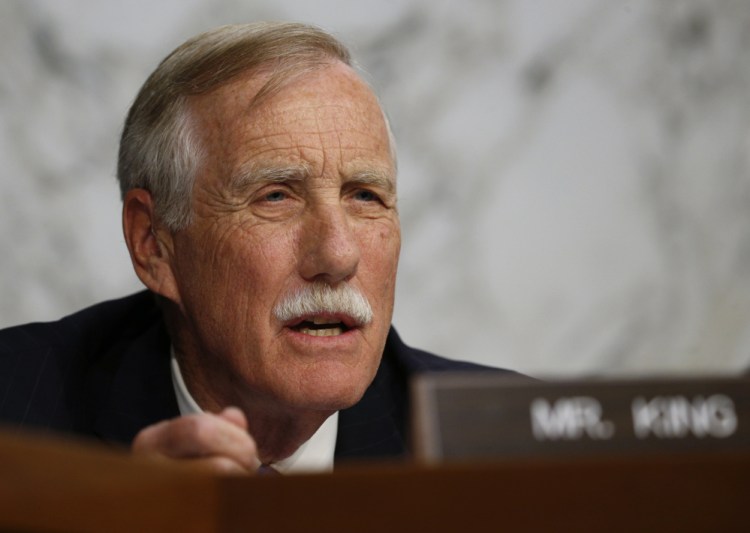Sen. Angus King of Maine had a tense and testy exchange with President Trump’s top intelligence officials after they refused to answer questions during a Senate Intelligence Committee hearing Wednesday.
National Security Agency Director Adm. Michael Rogers, Director of National Intelligence Dan Coats and acting FBI Director Andrew McCabe all refused to discuss their private conversations with the president before the committee. Specifically, Coats and Rogers wouldn’t answer whether they were asked by Trump to intervene in the FBI’s ongoing investigation into the Russian government’s possible collusion with his campaign last year. They also would not detail their conversations with former FBI Director James Comey, who was ousted by Trump last month.
While several senators on the committee, both Republicans and Democrats, expressed frustration with the lack of information that Rogers, Coats and McCabe provided, King stood out. His exchange was shared and discussed widely on social media, with many praising his tenacity and others accusing him of grandstanding.
DEMANDING LEGAL BASIS FOR SILENCE
King, an independent who caucuses with Democrats and is a former two-term governor, first asked McCabe why he was refusing to answer questions, to which McCabe answered that it wouldn’t be appropriate to comment on something that might fall under the purview of the special counsel who has been appointed to investigate Russia’s influence in the 2016 presidential election.
“So it’s your position that the special counsel’s entitled to ask you questions about this, but not an oversight committee of the United States Congress?” King asked McCabe.
“It is my position that I have to be particularly careful about not stepping into the special counsel’s lane,” McCabe said.
“I don’t understand why the special counsel’s lane takes precedence,” King said. “On the record, I’d like a legal justification for your refusal to answer the question today because I think it’s a straightforward question.”
McCabe didn’t offer a direct answer, at which point the senator then turned to Coats and Rogers.
“Is there an invocation by the president of the United States of executive privilege? Is there or not?” King asked Rogers.
“Not that I’m aware of,” Rogers replied.
“Then why are you not answering the questions?” King asked.
“Because I feel it is inappropriate, senator,” Rogers said.
“What you feel isn’t relevant, admiral,” King shot back.
Rogers later said he wasn’t trying to speak “in a contentious way,” to which King replied, “Well, I do mean it in a contentious way.”
Later, Rogers said the conversations referenced were classified, prompting another challenge from King.
“What is classified about a conversation involving whether or not you should intervene in the FBI investigation?” he asked.
“Sir, I stand by my previous comments,” Rogers said.
King then turned to Coats and asked him why he was refusing to answer questions, to which Coats said he didn’t think it was “appropriate.”
Why not answering Qs?
Rogers: “I feel it is inappropriate, senator”
King: “What you FEEL isn’t relevant, admiral” https://t.co/Ir3X5Iiwnh
— Bradd Jaffy (@BraddJaffy) June 7, 2017
“I’m not satisfied with ‘I do not believe it’s appropriate,’ or ‘I do not feel I should answer.’ I want to understand a legal basis,” King said.
Coats then answered, “I’m not sure I have a legal basis,” but said he would answer questions in a closed session.
When King pressed him on getting answers in a closed session, Coats cautioned that he still needed to determine whether the White House would invoke executive privilege.
King, in a brief interview after Wednesday’s hearing, acknowledged that he was frustrated.
“I was frustrated by the fact that these two witnesses, and to a lesser extent Mr. McCabe, were refusing to answer questions without providing any basis for their refusal,” he said. “You can’t just say, ‘This is something I don’t feel like answering.’ ”
King said McCabe came the closest to providing a basis when he said he didn’t want to answer any question that might be part of the special counsel’s investigation, but King rejected that argument.
“I think they are two different animals,” he said of the probe led by former FBI Director Robert Mueller. “Theirs is to determine whether any laws were broken. Ours is to determine facts, to see that something like this doesn’t happen in the future.”
CREATING A BUZZ ON SOCIAL MEDIA
Maine’s other U.S. senator, Republican Susan Collins, is also a member of the intelligence committee. She asked questions, but hers were far less contentious.
At one point, she asked Rogers about how the intelligence community decides “whether or not to comply with a request that comes from the president of the United States.”
“Off the top of my head, I would say that we comply unless we have reason to believe that we are being directed to do something that is illegal, immoral or unethical, in which case we will not execute that,” Rogers said.
There are a lot of lawyers in the committee room. Senator Angus King (UVa law school, class of 1969) is BY FAR the best litigator.
— Matt Viser (@mviser) June 7, 2017
As King grilled the three top intelligence officials, Washington journalists and pundits turned King’s displeasure into a trending topic on Twitter.
Tom Winter, an NBC investigative reporter, tweeted, “NSA Director Rodgers and DNI Director Coats refusing to answer questions in front of the American people today. Sen. King gives it to them.”
Charles Pierce, a political reporter for Esquire, wrote, “You come at the Angus, you best not miss,” a reference to a well-known line from the HBO show “The Wire.”
Matt Viser, the Boston Globe’s deputy Washington bureau chief, tweeted, “There are a lot of lawyers in the committee room. Senator Angus King (UVa law school, class of 1969) is BY FAR the best litigator.”
Wednesday’s intelligence committee hearing was a warm-up of sorts for Thursday, when Comey is set to testify. King said he expects Comey to be more forthcoming in his testimony Thursday, but couldn’t predict what might come out.
“We’ll have to wait and see what happens,” he said.
Eric Russell can be contacted at 791-6344 or at:
Twitter: PPHEricRussell
Send questions/comments to the editors.



